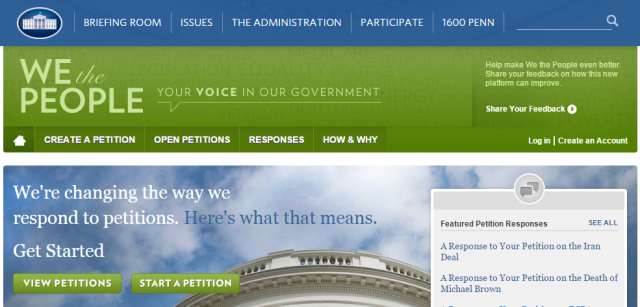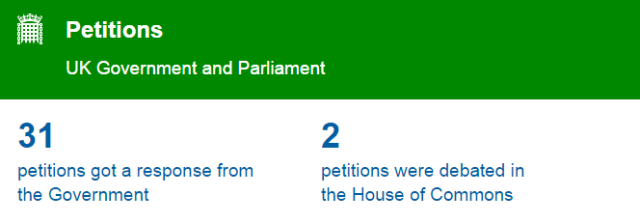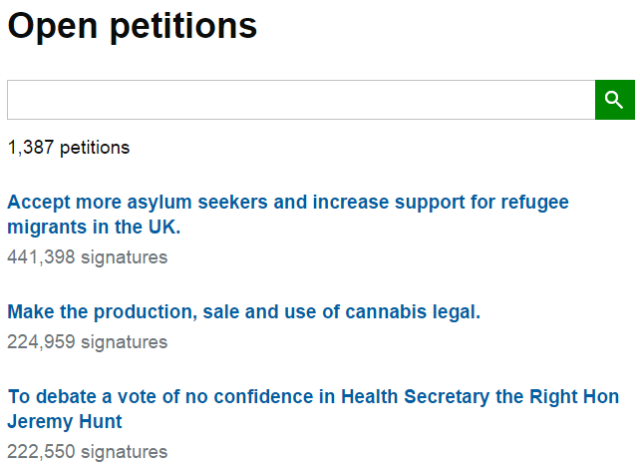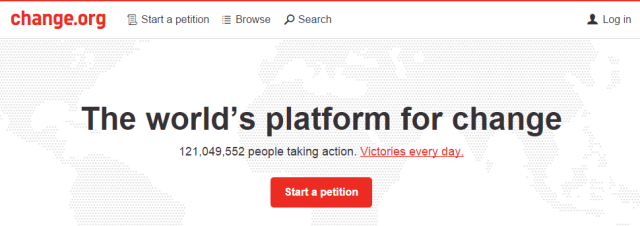To sign a petition, you used to need to show up to a town hall and physically sign a sheet of paper to demonstrate your support. But today, online petitions are the popular way to show your support for a cause. They're easy to make: just draft it up, send it around your social media feeds, and wait for the signatures to roll in. If you get enough, forward the list to the decision-makers, and you've changed the world! Right?
Maybe not. You shouldn't waste your time on a petition if it won't work, so we need to examine that. I've been investigating online petitioning to find out if e-signatures are a worthwhile mechanism for change. Why? Because it turns out petitioning can be a complex affair – and even if you can get the requisite number of e-signatures, they may not even be worth the bytes the characters take up.
Some people dismiss online petitioning as merely slacktivism, no better than hashtag activism. However, certain e-petitions can make a difference. To find out which ones can work, let's start by taking a look at the different platforms on offer.
Official Online Petitioning Platforms
How you should run an e-petition depends on where you live, the people to whom your petition is addressed, and where the issue is. A petition on the wrong platform, or to the wrong people, or signed by people who live outside of the relevant jurisdiction, is a total waste of time.
e-Petitioning in the United States
For Americans, the right to petition the government is enshrined in the 1st Amendment to the Constitution. If you want to petition the Obama Administration to change the law or redress grievances, the place to create your petition is We the People, the White House's very own platform for change.
On the We the People site, you'll find recent responses to popular petitions, and 90 petitions open for signing (as of the time of this writing), across 39 different topics. If a petition meets the signature threshold of 150 signatures in 30 days, it will be searchable within WhiteHouse.gov. If the petition reaches 100,000 signatures in the next 30 days, the White House will arrange an official response within 60 days.
The kinds of petitions We the People accepts is somewhat limited. From their Terms of Participation, you can only petition the Administration "to address a problem, support or oppose a proposal, or otherwise change or continue federal government policy or actions."
So what does that leave out? We the People does not accept "petitions that advertise or call for the endorsement or purchase of commercial goods or services, petitions that expressly urge the support or opposition of candidates for elected office, petitions that do not address the current or potential actions or policies of the federal government, or petitions that address a topic not included in We the People at the time the petition was created."
e-Petitioning in the United Kingdom
British citizens and United Kingdom residents can petition their government online through the UK's own online petitioning website.
They have their own set of standards for acceptable petitions. Provided a petition there meets them all and receives over 10,000 signatures, it will receive an official response from the government. With over 100,000 signatures, the issue will be considered for parliamentary debate. There are currently 1,397 open petitions on the UK Petition site.
Here is a sample of some of the most popular ones.
e-Petitioning in Canada
For Canadian petitioners, I have good news and bad news. The bad news is, so far, online petitions are only valid in the province of Quebec and the Northwest Territories. The Federal Government requires all original signatures on paper. The good news is, according to the CBC, digital petitions will be valid in Canada from the day the House of Commons sits after the federal general election on October 19 this year.
The platform to run a petition for the Canadian House of Commons doesn't exist yet, but when it is up, petitions hosted there will require a minimum of 500 signatures to be considered in the House of Commons and receive an official government response.
Petitioning Other Groups
As we saw with the Terms of Participation for We the People, there were lots of petition formats they don't accept. And what about petitions for other groups, like corporations? These kinds of petitions be hosted on other sites. One such petitioning platform we've looked at in 2011 is iPetitions. Since then, Change.org has become one of the most popular petitioning platforms.
Change.org hosts petitions in hundreds of countries for more than 120 million people. Change.org provides a set of Guides for your petition's success, from growing your support base, to getting media coverage, to delivering your petition.
Successful e-Petitions
Spotting a successful e-petition is trickier than a site like Change.org will make it seem. Change.org allows creators to mark petitions with Victory, but you can't always confirm that the petition is what made the difference.
Remember how we talked about e-petitions not being valid in Canada? That didn't stop Canadian man Tyler Doose from petitioning on Change.org to have the Government of Canada ban microbeads.
The petition urged Environment Canada to ban microbeads – but Environment Canada doesn't work that way. They don't just ban or allow things because so many people ask them to. Environment Canada banned microbeads not because of the petition, but because they reviewed 130 scientific papers that made it clear that the plastic beads aren't degrading – they're making their way throughout the ecosystem and the food chain, with unpredictable consequences.
So you might be asking, "What's the deal here?" The answer is, petitions are about more than just how many signatures they can amass. They're about getting groups of people together, united with one voice, and making a reason for decision-makers to listen – even if it is informal. A petition like that helped to put some attention on the issue of heinous microbeads, and shows Canadian support, but we cannot know exactly what difference it made because Environment Canada was addressing the issue anyway.
Challenges of Online Petitions
Writer Emma Howard brought up a major concern for online petitions in an article for The Guardian in 2014. Referring to Directgov, the old name for the UK's petitioning website, she says, "Even in the rare case of success, the person who started the petition has no way to inform those who signed it, never mind mobilise this mass base of supporters to take a campaign forward."
That's a problem because change can take more than a petition. Sometimes you need supporters to take more action, and that's hard to do if you don't have a way to rally them in the event a petition falls just short, or if it takes more action to make change than just a debate.
Another concern she brings up for online petitions is that, "When thousands of people put their name to a cause on Directgov, this data becomes the sole property of the government – whose very actions they are challenging." To me this veers on conspiracy theory. However, all the more reason to follow your petitions closely and track their success.
Just One Item in The Toolkit
I'm not going to spend a lot of time debating whether a digital signature is as meaningful as a handwritten one (though there are many ways to digitize your signature), when it's so easy to spread a digital petition. The fact is, different groups can assign them different value, and petitions are just one item in a toolkit full of different options you have to get engaged. Here are 5 great websites to make a difference in the world for example.
So the lesson here is, if you're going to start an online petition, give it a fighting shot by doing it right, and don't stop there. If you sign a petition, check back later to see how it's doing. Consider setting yourself a reminder in your calendar, to-do app, or in your Google Inbox that you'll receive towards the end-date of your favorite petitions.
If you're lucky enough to live in a democracy (even if your country has a first-past-the-post electoral system), vote every chance you get. There are lots of great ways to learn about candidates online, like how this set of tools for UK citizens helps uncover political leanings. Outside of election season, volunteer. Visit your local community center. Write to your local representatives to complain (or to thank them if they do right by your wishes). Attend protests that you agree with.
Do you think online petitions are worthwhile? Let us know by commenting below. And while you're at it, feel free to share your other favorite ways to make a difference - or tell us about the online petitions you've signed.







